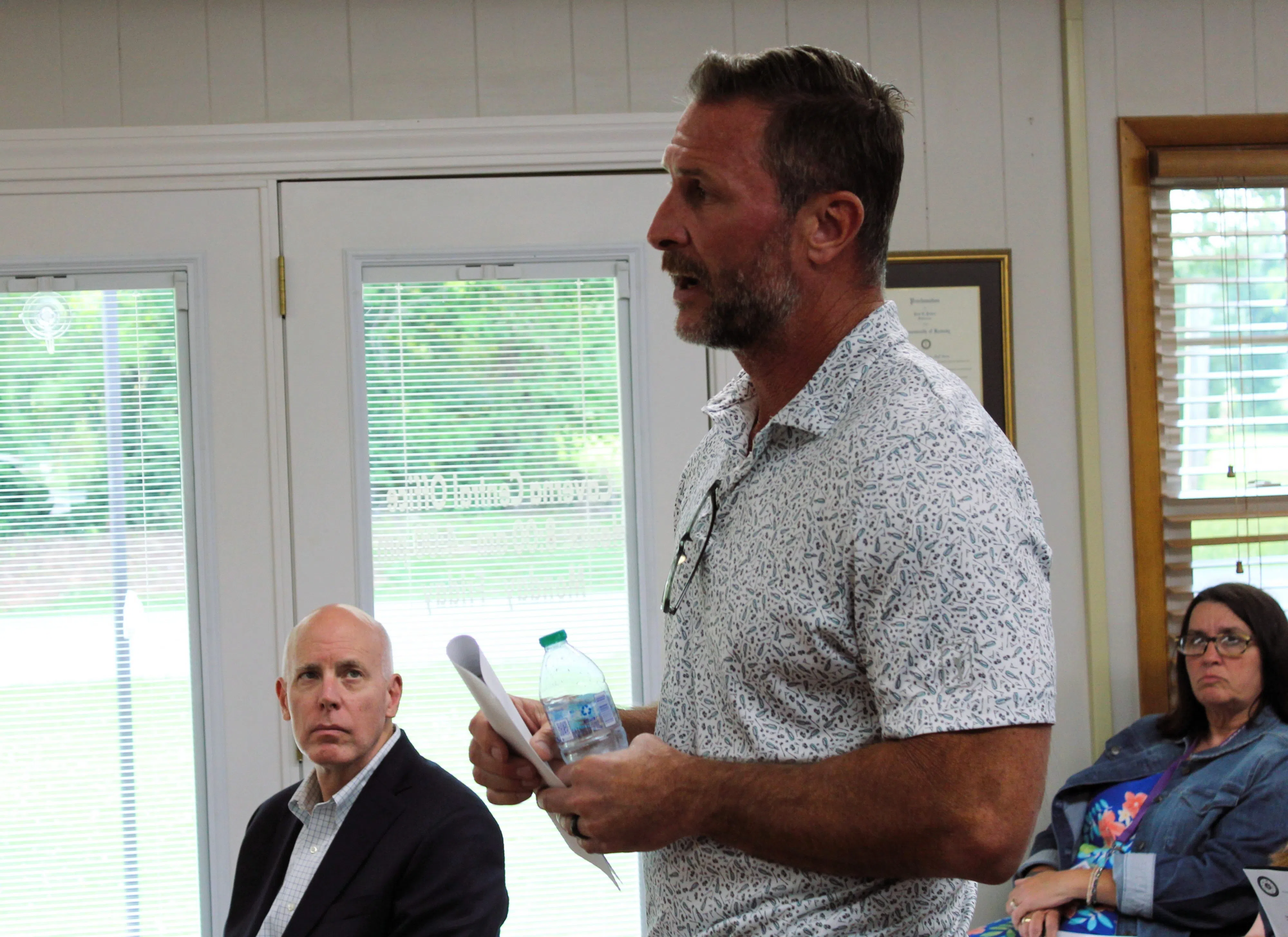By GAGE WILSON
for Glasgow News 1
The Caverna Board of Education was briefed by the district’s Strategic Plan Aspiration Committee, which is a team focused on producing a system where students leave school ready to navigate the “real world.”
Superintendent Amanda Abell opened the Thursday, June 12, meeting by outlining the structure behind the plan. “We revised our mission and vision last year,” she said. “We included stakeholders and parents to set those aspirations, and then we divided those into committees.”
“I asked a department head or director to lead each one.” She noted that the school board’s role is to review and offer feedback, which will allow the committee members to refine their draft before final approval — part of a quality-assurance process to keep the work aligned.
Jessi Hampton, who oversees the district’s gifted and talented program, led off the presentations with a focus on attendance—a foundational metric for student success. “We made a goal that each year, we would improve attendance by 10 percent as a district.”
Hampton suggested using Infinite Campus to track student data in real time, flagging absences early for intervention. She also mentioned reviving enforcement of the state’s “No Pass No Drive” law, which allows the district to work with the state to revoke licenses when needed.
“If they’re in our high school and they can drive, then they can get their license taken away,” she said.
Next was Whitney Paul, the district’s coordinator for instruction and curriculum, who reported on educator development — describing it as refining the internal machinery that supports classrooms. “We want to make sure we’re offering training that’s really pertinent to what teachers are doing,” she said.
Paul outlined a goal to create “Professional Learning Communities,” or PLCs, that help teachers share tools and troubleshoot challenges. “If one teacher is struggling in a specific area — like keeping students engaged — they can talk with others and get some ideas. It’s peer-to-peer,” she said. She emphasized that development would be “needs-based,” built from conversations with principals and teacher evaluations.
Melissa Tobin, an elementary school teacher, followed with a presentation on community and family partnerships — components she described as essential to a fully functioning student support system. “Relationships are the grounds for student success,” she said. One of her goals is to increase family involvement by reintroducing earlier outreach efforts like home visits and “welcome wagons,” building stronger connections between schools and homes.
The final presentation came from high school psychologist April McClarin, who focused on school environments and student safety.
“By 2028, we want 90 percent of our students feeling psychologically and physically safe,” she said. That goal would be measured by the “Student Voice” survey, already distributed during the annual Kentucky Summative Assessments.
McClarin shared a proposal for designated quiet spaces — areas built for reflection rather than socializing — and encouraged a district-wide emphasis on ensuring every student has a trusted adult connection, a strategy she called “Name and Claim.” She also stressed the need for continued staff training to recognize early warning signs of emotional distress.
While no formal actions were taken during this portion of the meeting, board members engaged closely with the updates.
The presentations formed just the first segment of the evening’s business. With strategic plan reports out of the way, Caverna’s board moved on to recognitions and contract renewals at Thursday’s nearly three-hour meeting.
Amid the bustle of attendees leaving, consent items were approved unanimously.
Next came a lengthy discussion regarding the district’s ongoing contract with Lake Cumberland Family Medical Centers. Abell noted the district’s overall satisfaction with the provider, but said she had still solicited quotes from other facilities.
One response came from Alan Alexander of The Medical Center, who, according to Abell, told her there was “no way that he would be cheaper” than the current provider. She also reached out to Graves Gilbert Clinic, though no response had been received by the time of the meeting.
Under the current contract, the district pays 30 percent of one nurse’s salary — roughly $15,000, per Abell. However, the provider has been supplying two nurses at no additional cost.
While Abell praised the arrangement, board member Allison Dennison raised concerns about ambiguity in the new contract, which obligates the provider to only one nurse.
“The contract is written that way because they’re only charging us for the one nurse’s 30 percent salary,” Abell clarified, though Dennison cautioned that hidden expenses could become an issue down the line.
Attention then turned to optional services outlined in the contract. One such service, an optometry clinic, drew support from Chairwoman Jennifer Briggs.
“If we’re going to agree to this contract, I’m going to expect an optometry clinic out here for these kids,” she said.
Abell clarified that the contract functioned as a menu of offerings, and the board could accept or reject services as needed.
“I’m not trying to argue,” said Briggs. “I mean dental and optometry — those aren’t services kids can always get.” The board ultimately approved the contract, with the stipulation that it be reviewed annually.
The district’s parental leave policy also returned for discussion. A proposed change would allow 30 days of paid leave, but board members questioned whether the language clearly included adoptive parents or those using a surrogate.
Abell said she consulted Garnett Thurman with the Kentucky School Boards Association, who confirmed that under current legislation, only “district employees who give birth” are eligible for the additional 30 days. The district does already provide 30 days of paid parental leave, but the state-level benefit would not extend beyond that to non-birth parents.
Also on the agenda was the adoption of a communications platform, a state-mandated requirement aimed at ensuring safe, monitored interactions between staff and students. Abell again recommended Apptegy, the system already used for district-wide calls.
Dennison raised a question about disciplinary procedures: Would consequences be proportional to the nature of any unapproved communication?
“It will be a formal memo,” Abell said. “Mr. Beauchamp texting someone to mow his yard is a lot different than a teacher [sexually exploiting] a student.” She added that disciplinary action would likely remain at the discretion of the district.
The remainder of the meeting moved quickly. Though the board had originally planned to go into closed session for the superintendent’s evaluation, that item was postponed due to the absence of member Jennifer Ballard.
A special-called meeting was scheduled for Tuesday, June 17 at 5:15 p.m. to address the matter.






